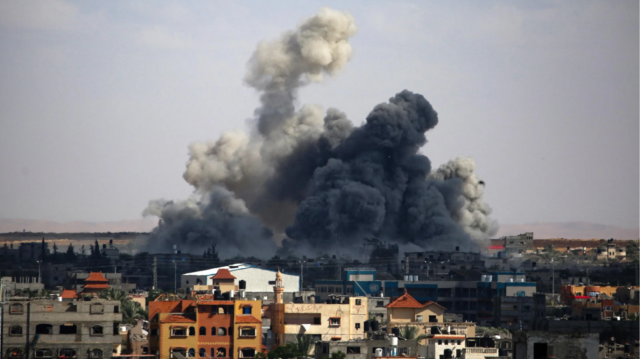The Hostage Crisis Unfolding in Gaza
In a tense development, several reports have emerged about the hostage situation in Gaza, including the death of an Israeli-British captive and a plea from the U.S. President for their release.
Published May 12, 2024 - 00:05am

Image recovered from yenisafak.com
The complex and evolving hostage situation in Gaza has captured international attention, raising concerns over the well-being of captives and the intense geopolitical implications. Recently, Hamas's armed wing, the Ezzedine Al-Qassam Brigades, declared the death of Nadav Popplewell, an Israeli-British hostage who had been held in captivity since the October 7th raids. The group released a video showing Popplewell alive but later announced that he succumbed to his injuries from an Israeli airstrike.
On the diplomatic front, U.S. President Joe Biden has indicated that a truce between the conflicting parties could be imminent if Hamas were to release the hostages, as per his statements during a fundraising event in Seattle. Meanwhile, the situation remains volatile with ongoing Israeli airstrikes in Gaza.
It is confirmed that Popplewell, who was 51 years old at the time of his capture, was seized from his home in Kibbutz Nirim during an attack by Hamas, along with his mother Hanna Peri, who was subsequently released during a truce in November. The family's plight was intensified by the killing of Popplewell's older brother in the same attack.
Hamas and Israel have been engaged in murky indirect negotiations for a deal that could potentially end over seven months of war, which has led to the death of hundreds and the capture of many as hostages. The families of the hostages and citizens have exerted pressure on the Israeli government, with protests in Tel Aviv and Jerusalem demanding immediate action.
The tragic developments continue to unravel in Gaza amidst international calls for restraint and a humane resolution to the crisis involving captives. The humanitarian situation has further deteriorated with reports that Israeli airstrikes have incapacitated hospitals in Gaza, limiting access to intensive medical care for the injured, including hostages.
The loss of Nadav Popplewell has been met with a somber response from the international community, and condolences have extended to his family, as they grapple with this compounding tragedy. In Gaza, the atmosphere is one of heightened tension, with the conflict spilling increasingly into civilian domains. Civilians, caught in the crossfire, find themselves torn between calls for peace and the bitter reality of ongoing hostility.
As the international community watches, the United Nations and various human rights organizations have stepped up their appeals for de-escalation in the region. The UN Secretary-General has emphasized the need for both sides to exercise utmost restraint and to prioritize humanitarian considerations above all else. This includes the safe treatment and the prompt release of any remaining hostages.
Israel's Defense Forces (IDF) maintains that their military actions are targeted at Hamas's military infrastructure and are a response to attacks emanating from Gaza. However, the IDF faces growing scrutiny as reports of civilian casualties mount. Israel contends with widespread criticism as international advocates and leaders call for investigations into potential human rights violations.
On the ground, the situation has resulted not only in loss of life but also in the devastating compromise of Gazan infrastructure. Schools, homes, and public services have been eroded by the ceaseless conflict, leaving the population desperate for respite. The destruction has caused a humanitarian crisis, with shortages of food, water, and basic necessities becoming alarmingly common.
Efforts to mediate the conflict persist, with neighboring Egypt often playing a pivotal role. Egypt has historically acted as a mediator between Israel and Hamas, leading to temporary ceasefires in the past. Both Egyptian and international diplomats stress the urgency of renewed negotiation efforts, pointing to the escalating human cost of delay.
At the heart of this conflict lie key issues yet to be resolved, which include territorial disputes, security concerns, and the fulfillment of previous agreement terms. Experts suggest that a combination of diplomatic engagement, economic relief for Gaza, and addressing the root causes of the conflict may be necessary to prevent further deterioration of the situation.
While the Israeli public remains divided over the government's approach to Gaza, there is an overarching desire for peace and security. In the wake of the loss of Popplewell and others, numerous voices call for a reassessment of policies to prevent future tragedies. Advocates for peace are urging both sides to consider the long-term benefits of a sustainable resolution over short-term military victories.
The evolvement of this conflict into yet another cycle of retaliation has concerned those who warn of a worsening humanitarian disaster. International bodies, including the International Red Cross, have sought access to Gaza to deliver aid and to monitor the treatment of captives. The international community remains hopeful that the current efforts will pave the way for a ceasefire and lead to substantive talks to end the decades-long Israeli-Palestinian conflict.
In conclusion, the situation in Gaza serves as a grim reminder of the complexities and human costs of protracted conflicts. The call for a humane resolution remains loud and clear, and the world looks on in anticipation of a peaceful turn in this enduringly turbulent chapter of the Middle East.







